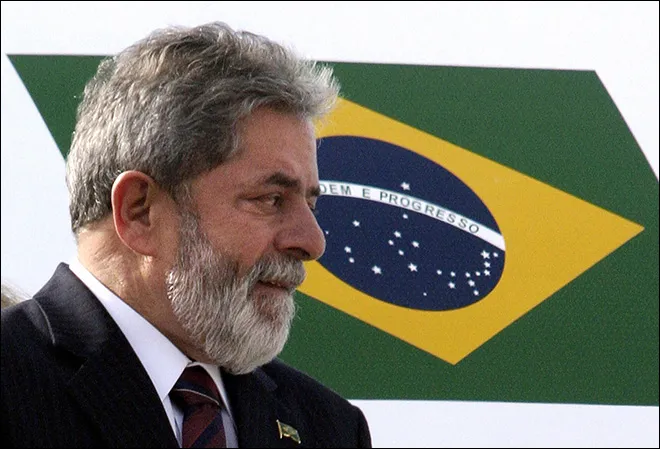
“They tried to bury me alive, and yet here I am,” exclaimed Luiz Inácio ‘Lula’ da Silva in his first speech as president-elect of Brazil.
Sometimes, reality is stranger than fiction. Lula’s comeback story would be the envy of even Bollywood drama scriptwriters. A two-time former president who governed Brazil from 2003 to 2010, Lula was arrested in 2018; after spending 580 days in jail, the charges were annulled on the grounds of a politically motivated trial. In the 2022 elections, the odds were against Lula: his opponent was incumbent president Jair Bolsonaro, a controversial figure who stood tall as the leader of Brazil’s ‘beef, bible, and bullets’ conservative movement; an incumbent president had never lost a re-election bid since Brazil’s return to democracy in the 1990s. Bolsonaro used every advantage available to an incumbent, from profligate social spending to woo voters to the use of public funds to grant favours to politicians. Yet, Lula won, albeit by a relatively small margin of 2 million votes.
As the Superior Electoral Court (TSE in Portuguese) declared Lula the victor at 8pm on 30 October, the day of the vote, Brazil’s democratic institutions showed commendable restraint and maturity.
Even more edifying than Lula’s personal saga is the story of Brazil’s democracy. Media and analysts across the world overcast doubts on the stability of Brazilian democracy: Will we see a return of Brazil’s dark past through a military dictatorship? Will Brazil’s democracy suffer the scars of electoral fraud, as the United States has since November 2020? Will Bolsonaro, who bellowed that there are only three possible electoral outcomes—of him being arrested, killed, or emerging victorious—attempt to destabilise Brazil’s institutions?
Ultimately, none of these scenarios came to pass. Despite its flaws, Brazil’s democracy stood strong. As the Superior Electoral Court (TSE in Portuguese) declared Lula the victor at 8pm on 30 October, the day of the vote, Brazil’s democratic institutions showed commendable restraint and maturity.
Yet, it still begs the question: Why is Bolsonaro not attempting what Trump continues to do in the US by crying electoral fraud? The answer lies in the balanced distribution of power in Brazilian democracy. Democratic institutions like the congress, judiciary, executive, electoral authority and even political parties all share an even distribution of power. In the US, the outsized clout of the Republican and Democratic parties allows room for unchecked power, where parties have influence over any and all democratic institutions, including the judiciary, state electoral authorities, and the media. In Brazil’s case, the judiciary, legislative, the Tribunal Superior Eleitoral (TSE) and even staunch allies of Bolsonaro all took a united stand: The election results are final and no allegations of fraud will be tolerated. Alexandre Moraes, the TSE chief, declared that anyone who contests the election results or calls for a military coup will be “severely punished” and “treated as criminals.” In such a scenario, it would be counter-productive for Bolsonaro to allege fraud, and would possibly hamper his future prospects in Brazilian politics.
Democratic institutions like the congress, judiciary, executive, electoral authority and even political parties all share an even distribution of power.
Lula 3.0
In his third presidential term, Lula will face mounting challenges. These include:
- Polarisation: The rather small margin of victory of 50.9 percent to 49.1 percent would naturally indicate that Brazil is polarised. Yet, we should refrain from arriving at premature conclusions on Brazil’s polarisation. Homicides in Brazil are at a 25-year low, economic growth is slowly rebounding, and most of all, regardless of who they voted for, Brazilians are tired of nearly a decade of socio-economic instability and want to move on to greener pastures. Lula has made a good start, dispelling the myth that there are ‘two Brazils’ by announcing that he will govern just as much for those who did not vote for him by forming a moderate, centrist government.
- Congress: Lula’s Workers’ Party (PT in Portuguese) does not enjoy a majority in either house of Brazil’s congress—that laurel belongs to Brazil’s Centrão (center), a big-tent grouping of parties that hold no ideological positions. As the saying goes in Brazil, “the Centrão can never be bought, but it can always be rented.” The conservatives in Brazil’s Congress will keep the government on its toes, but we should not underestimate Lula’s ability as a dealmaker to form alliances in order to push through reforms.
- Economy: Unlike Lula’s previous two terms in 2003-2010, today’s economic landscape is hardly favourable. Brazil’s economy has been battling a recession since 2014, exacerbated further by the COVID-19 pandemic. Economic growth picked up only in 2021, on account of a contraction of 3.9 percent in 2020. The global economy has been battered by the war in Ukraine, sending commodity prices to all-time highs and causing disruptions to global supply chains. Lula will be forced to follow a pragmatic fiscal policy to keep inflation low and stimulate economic growth.
Homicides in Brazil are at a 25-year low, economic growth is slowly rebounding, and most of all, regardless of who they voted for, Brazilians are tired of nearly a decade of socio-economic instability and want to move on to greener pastures.
In addition to these broad challenges, Lula will also have to contend with the ‘beef, bible, and bullets’ conservative movement, which holds considerable influence in all walks of Brazilian society. Despite these issues, Lula’s experience should help him pull through; he knows that this is more than just a presidency—his legacy is on the line. At the end of his previous two terms in 2010, he left office with a 90 percent approval rating, prompting Barack Obama to call him “the most popular politician on Earth”. While he is unlikely to retain that moniker, Lula will strive to cement his place as one of the most important leaders in Brazilian history.
Although we cannot expect Lula to replicate the impressive global outreach of his previous two terms, Brazil’s foreign policy will undergo massive changes. Latin American regional integration, a passion project for Lula, will be on the cards again. Lula has always been fond of India—visiting the country three times, including as chief guest at the Republic Day parade in 2004—and his return will infuse more momentum in India-Brazil ties, especially given India’s presidency of the G20. Brazil’s foreign policy, which had retreated to minor-league status over the past decade, will be in full swing now, and the world will eagerly watch the country’s return to the global stage beginning in 2023.
The views expressed above belong to the author(s). ORF research and analyses now available on Telegram! Click here to access our curated content — blogs, longforms and interviews.




 PREV
PREV


